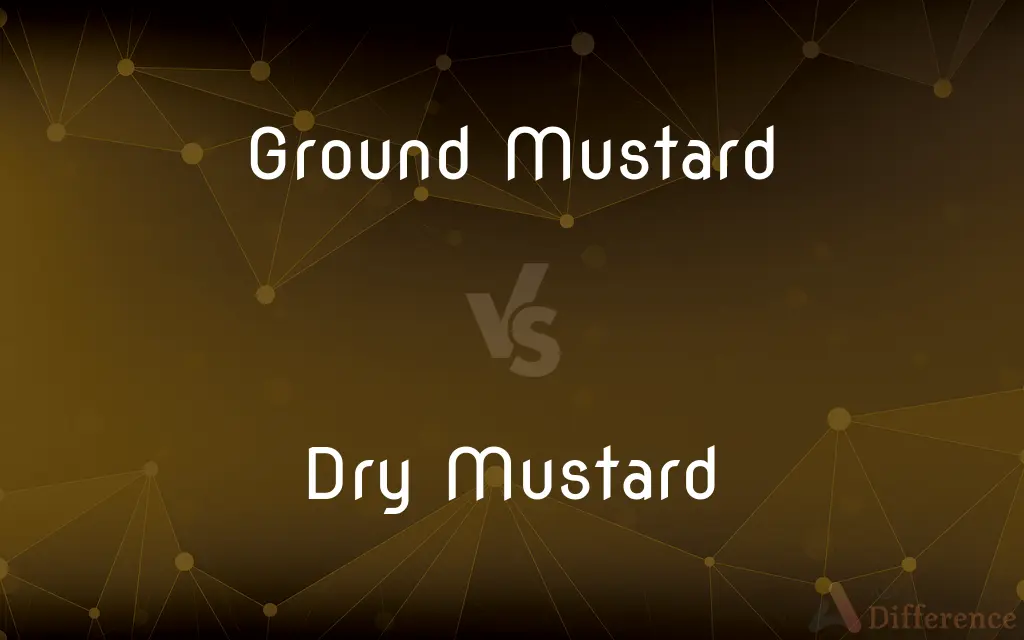Ground Mustard vs. Dry Mustard — What's the Difference?
Edited by Tayyaba Rehman — By Fiza Rafique — Published on December 28, 2023
Ground Mustard refers to mustard seeds finely ground into a powder. Dry Mustard is often synonymous with Ground Mustard but can also mean any dehydrated form of mustard.

Difference Between Ground Mustard and Dry Mustard
Table of Contents
ADVERTISEMENT
Key Differences
Ground Mustard and Dry Mustard are terms often used interchangeably in culinary contexts. Ground Mustard specifically denotes mustard seeds that have been finely ground into a powder. This powder is typically yellowish or brownish, depending on the variety of mustard seed used. On the other hand, Dry Mustard might be used to refer to this same powder, but it can also be a broader term encompassing any dehydrated form of mustard.
When a recipe calls for Ground Mustard, it's seeking the distinct sharpness and heat derived from the crushed mustard seeds. This form is pure, without any additives, and its intensity can be a defining characteristic in dishes. In comparison, Dry Mustard can be the same as Ground Mustard when it refers to the powder, but it might also allude to other dried mustard products, possibly with added ingredients.
It's worth noting that while Ground Mustard is always in powdered form, Dry Mustard has the potential for varied textures depending on the specific product labeled as such. If a recipe isn't specific, and you have a product labeled Dry Mustard that isn't powdered, it's essential to consider the intended texture and flavor of the dish.
Both Ground Mustard and Dry Mustard serve to introduce that signature mustard flavor without the liquid content found in prepared mustards. They're invaluable in dry rubs, spice blends, and dishes where moisture control is critical.
Comparison Chart
Definition
Mustard seeds finely ground into a powder.
Any dehydrated form of mustard, often synonymous with Ground Mustard.
ADVERTISEMENT
Texture
Always powdered.
Usually powdered, but can vary.
Ingredients
Pure mustard seeds.
Typically just mustard seeds, but can have added ingredients.
Usage in Recipes
Provides sharpness and heat.
Can offer varied intensities and flavors.
Interchangeability
Specific to powdered form.
Broader; can sometimes be used interchangeably with Ground Mustard.
Compare with Definitions
Ground Mustard
Mustard in its most concentrated powdered form.
Ground Mustard works well in dry spice blends.
Dry Mustard
Dehydrated form of mustard, often in powdered form.
I replaced the wet mustard with Dry Mustard to keep the batter dry.
Ground Mustard
The powdery result of grinding mustard seeds.
The marinade's secret ingredient was Ground Mustard, providing a gentle kick.
Dry Mustard
A versatile ingredient, offering mustard flavor without moisture.
Using Dry Mustard in the rub ensured the meat remained crispy on the outside.
Ground Mustard
Finely powdered mustard seeds.
To make the spice rub, I added a teaspoon of Ground Mustard for heat.
Dry Mustard
A term encompassing powdered or other dry mustard products.
The Dry Mustard in the pantry comes in handy for various recipes.
Ground Mustard
A dry spice derived solely from mustard seeds.
A pinch of Ground Mustard was all the salad dressing needed.
Dry Mustard
Often synonymous with Ground Mustard but can include other forms.
Always check the texture of Dry Mustard before adding it to dishes.
Ground Mustard
Pure crushed mustard seeds without additives.
The Ground Mustard gave the curry a distinct tangy flavor.
Dry Mustard
Mustard that has had all its moisture removed.
Dry Mustard can be rehydrated to make a paste.
Common Curiosities
Can I use Ground Mustard and Dry Mustard interchangeably in recipes?
Generally, yes, especially if Dry Mustard is in powdered form. However, always consider the specific type and texture of Dry Mustard you have.
Why would a recipe prefer Ground or Dry Mustard over liquid mustard?
Using Ground or Dry Mustard provides the mustard flavor without adding moisture, which is crucial in some recipes.
Does Ground Mustard have additives?
Ground Mustard is typically just pure crushed mustard seeds without additives.
How does Dry Mustard differ from Ground Mustard?
While often synonymous, Dry Mustard can refer to any dehydrated form of mustard, while Ground Mustard specifically refers to the powdered form.
What dishes typically use Ground Mustard?
Ground Mustard is commonly used in spice rubs, dressings, sauces, and curries.
Can I rehydrate Dry Mustard to make a mustard paste?
Yes, mixing Dry Mustard with water can create a paste resembling prepared mustard.
How should I store Ground and Dry Mustard?
Store both in a cool, dry place in airtight containers to retain their potency.
What is Ground Mustard made from?
Ground Mustard is made from finely ground mustard seeds.
Do Ground Mustard and Dry Mustard have a strong flavor?
Ground Mustard has a concentrated mustard flavor, and the strength of Dry Mustard can vary depending on its form and any added ingredients.
Are there different varieties of Ground Mustard based on mustard seed type?
Yes, Ground Mustard can be yellowish or brownish based on the variety of mustard seed used.
How long does Ground Mustard retain its flavor?
Ground Mustard, like most spices, is best used within a year for optimal flavor.
If I run out of Ground Mustard, what can I use as a substitute?
Prepared mustard can be a substitute, but adjust for moisture, or horseradish powder can add a similar heat.
Is Dry Mustard always in powdered form?
Often, but not always. Dry Mustard can refer to any dehydrated form of mustard.
Can I make Ground Mustard at home?
Yes, by grinding mustard seeds into a fine powder using a spice grinder or mortar and pestle.
Share Your Discovery

Previous Comparison
Cilia vs. Microvilli
Next Comparison
Indian Education vs. Western EducationAuthor Spotlight
Written by
Fiza RafiqueFiza Rafique is a skilled content writer at AskDifference.com, where she meticulously refines and enhances written pieces. Drawing from her vast editorial expertise, Fiza ensures clarity, accuracy, and precision in every article. Passionate about language, she continually seeks to elevate the quality of content for readers worldwide.
Edited by
Tayyaba RehmanTayyaba Rehman is a distinguished writer, currently serving as a primary contributor to askdifference.com. As a researcher in semantics and etymology, Tayyaba's passion for the complexity of languages and their distinctions has found a perfect home on the platform. Tayyaba delves into the intricacies of language, distinguishing between commonly confused words and phrases, thereby providing clarity for readers worldwide.













































